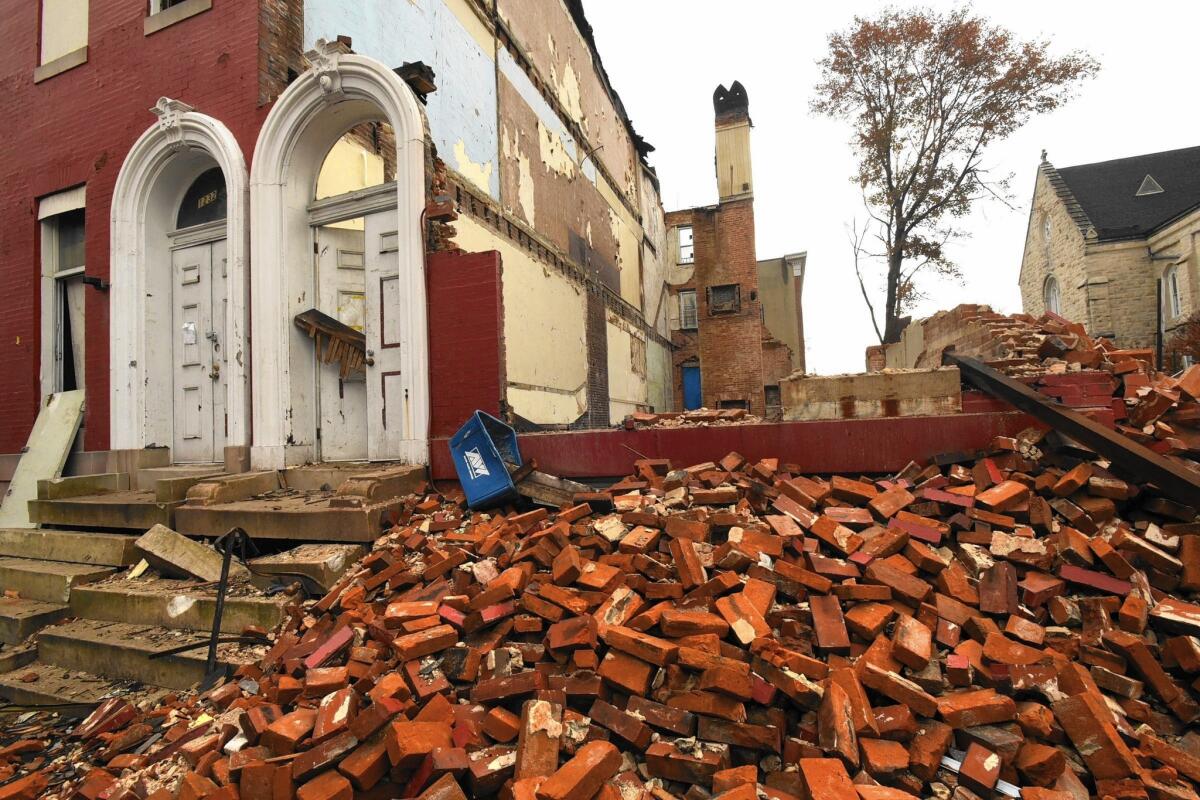Razing of Freedom House, a Baltimore civil rights landmark, shocks activists

- Share via
Reporting from BALTIMORE — This city’s first African American councilman lived in the three-story row house, and the Rev. Martin Luther King Jr. used to attend meetings there. Eleanor Roosevelt and Clarence Mitchell Jr. did too.
The National Assn. for the Advancement of Colored People saw the old building on Druid Hill Avenue in Baltimore’s Upton neighborhood as being so crucial to the civil rights movement that the organization dubbed the place “Freedom House” decades ago.
Now it’s a pile of rubble, torn down without fanfare, and — preservationists and activists say — little warning that a place with so much history would be knocked down.
Some say they are hurt that the Bethel African Methodist Episcopal Church, which has owned the property since the early 1980s, didn’t consult residents, preservationists or civil rights leaders before getting a permit from the city to demolish the building.
“You don’t come into Baltimore and tear down our history,” said Louis Fields, who offers tours of historic African American sites in the city, as he stood across the street from the demolished house. Only a chimney and the home’s old arched doorway remained.
Freedom House, or what’s left of it, is just a short distance beyond city and state historic preservation zones that could have spared it from the wrecking ball. Church officials and trustees did not comment on the demolition.
“I certainly recognize that the building has significant historical value,” said Councilman Eric T. Costello. “But because it’s a privately owned property, because the [owners] have a valid permit and because it’s not located in a historic district, not much can be done.”
Several protesters who attended a rally last week said they’d heard nothing about last month’s demolition until Baltimore Heritage, a historic-preservation nonprofit, posted a notice on its blog and Facebook page.
Helena Hicks, 81, was one of those caught off guard.
A longtime civil rights activist who took part in a 1955 sit-in at the city’s old downtown Read’s Drug Store that helped force the chain to desegregate its lunch counters, Hicks recalled attending meetings at Freedom House as a child, absorbing her first lessons on demonstrating to help forge change.
Hicks says she blames city officials for standing by as a civil rights landmark was erased from Baltimore’s landscape.
She expressed disappointment that the church’s senior pastor — whose late mother, she recalled, was active in the civil rights movement — didn’t show up to talk with protesters as they gathered outside Freedom House. The Rev. Frank M. Reid III did not immediately comment.
“Why isn’t he out here?” she said.
Meanwhile, Johns Hopkins, executive director of Baltimore Heritage, handed out fliers naming other historic sites in the neighborhood that could face similar fates.
“We lost Freedom House — for some of us, unexpectedly — even though it was not just a hub but the hub for civil rights in Baltimore,” he said through a loudspeaker. “That makes me cry.... Shame on us if we can’t convert this energy into preserving other [historic] buildings.”
More to Read
Sign up for Essential California
The most important California stories and recommendations in your inbox every morning.
You may occasionally receive promotional content from the Los Angeles Times.













